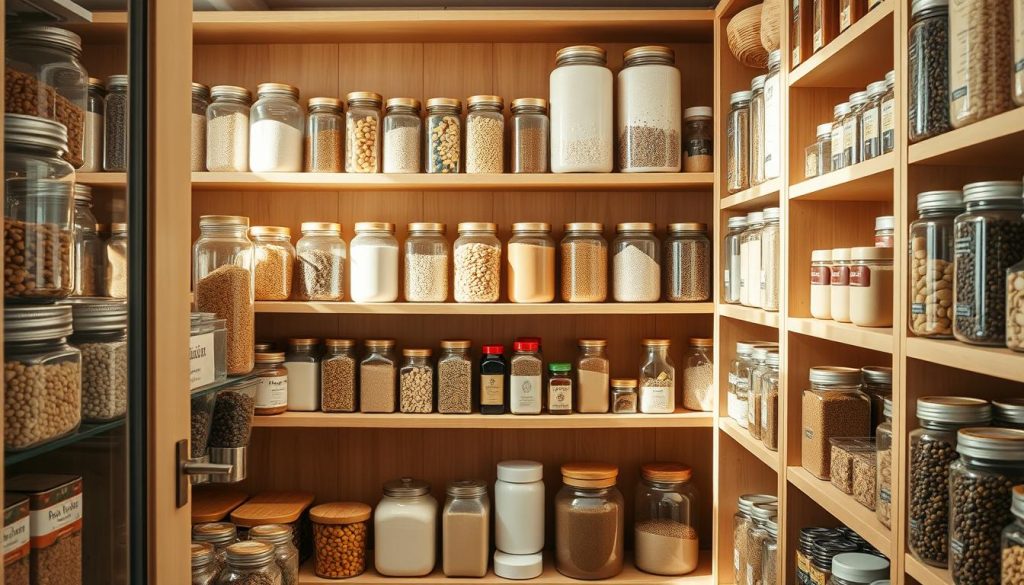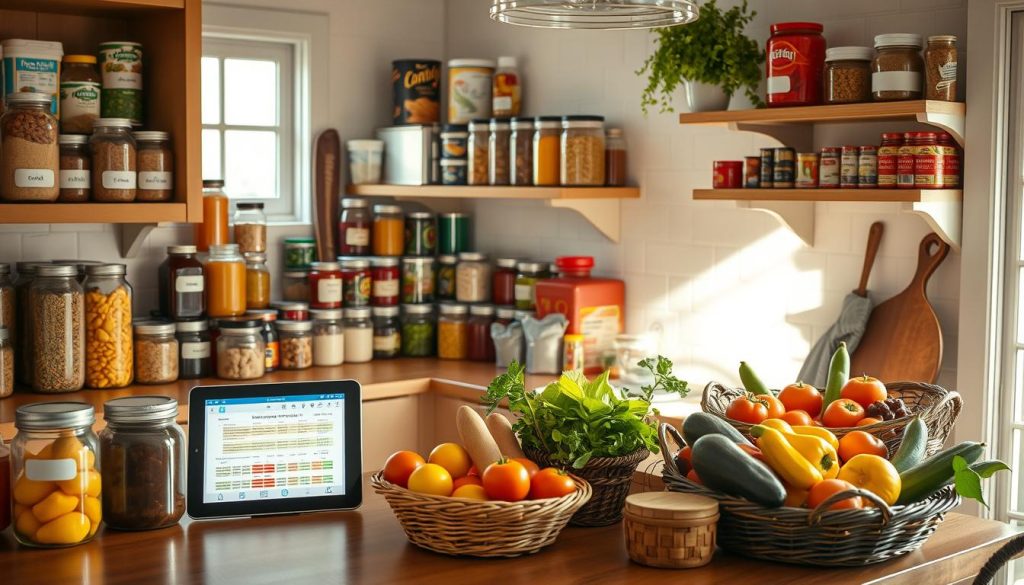I’m excited to share my favorite bulk shopping tips with you! Buying in large quantities can save you money and time. In this guide, I’ll show you how to save money and make shopping trips more efficient.
Bulk shopping isn’t just about grabbing the biggest package you see. It’s an art that requires planning and organization. I’ve learned through trial and error how to make the most of warehouse clubs and wholesale stores. Now, I’m ready to pass on these money-saving secrets to you.
Get ready to transform your shopping habits and watch your savings grow. Let’s dive into the world of smart bulk buying together!
Understanding the Benefits of Bulk Shopping
Bulk shopping has changed the game for smart shoppers. Warehouse clubs and wholesale buying offer more than just savings. They bring big benefits that make shopping better.
Cost Savings Through Volume Discounts
One key perk of bulk shopping is the big savings. Buying more means lower prices per item. This is great for things you use a lot, like household items.
| Product | Regular Price | Bulk Price | Savings |
|---|---|---|---|
| Toilet Paper (24 rolls) | $15.99 | $12.99 | 19% |
| Laundry Detergent (150 oz) | $21.99 | $17.49 | 20% |
| Rice (25 lbs) | $18.99 | $14.99 | 21% |
Reducing Packaging Waste
Buying in bulk also cuts down on waste. I use less packaging, which is good for the planet. It’s a small step towards living greener.
Fewer Shopping Trips Required
Another plus is fewer trips to the store. With more items at once, I don’t have to shop as often. This saves time and gas, which is a big plus in today’s fast-paced life.
Adopting bulk shopping has really improved my shopping routine. It’s not just about saving money. It’s also about reducing waste and saving time, making it a smart choice for many.
Identifying the Best Items to Buy in Bulk

Smart bulk shopping can change how we organize our pantries and save money. Let’s look at the top bulk ingredients for a tidy kitchen.
Non-perishable foods are at the top of my list. These include:
- Rice
- Pasta
- Dried beans
- Canned vegetables
- Nuts and seeds
Cleaning supplies are also great for buying in bulk. I always get large amounts of:
- Laundry detergent
- Dish soap
- All-purpose cleaners
- Paper towels
Personal care items with long shelf lives are also good for bulk buying:
- Toilet paper
- Shampoo
- Toothpaste
- Deodorant
When picking bulk items, I look at three important things:
| Factor | Importance | Example |
|---|---|---|
| Shelf Life | Ensures product quality over time | Dried pasta lasts 1-2 years |
| Storage Requirements | Affects pantry organization | Airtight containers for grains |
| Frequency of Use | Justifies bulk purchase | Daily use items like coffee |
By focusing on these items and factors, I’ve made my bulk shopping better. This way, I keep my pantry organized and save space and money.
Navigating Warehouse Clubs and Wholesale Stores

Warehouse clubs and wholesale buying can save you a lot of money. I’ve picked up some tips to get the most out of these places. Let’s see how to shop smart in these stores.
Comparing Membership Options
When picking a warehouse club, it’s key to look at membership levels. Here’s a quick guide:
| Membership Tier | Annual Fee | Key Benefits |
|---|---|---|
| Basic | $60-$65 | Store access, member-only prices |
| Premium | $120-$130 | Cash back rewards, early shopping hours, extra services |
Making the Most of Store Layouts
Warehouse clubs aim to get you to buy more. I stick to my shopping list and avoid the middle aisles. That’s where the tempting extras are. Staples and fresh foods are at the edges.
Utilizing Store Apps and Digital Coupons
Most warehouse clubs have mobile apps with digital coupons and special deals. I always check these before I go. Some apps even help you make shopping lists and track your spending. It’s a smart way to save more during wholesale buying trips.
By knowing about membership options, store layouts, and digital tools, you can shop better and save more at warehouse clubs.
Bulk Shopping Tips for Savvy Consumers
Successful bulk shopping needs careful planning and smart strategies. Follow these tips to save money and make shopping easier.
Start by making a detailed shopping list before you go. This stops impulse buys and ensures you only get what you need. Think about how much space you have and how fast you’ll use things.
It’s important to compare unit prices to save money. The bigger package isn’t always the best deal. Always calculate and compare prices per unit or ounce to find the best value.
When buying in bulk, check the quality of what you’re buying. Look at perishables closely to make sure they’ll last. For non-perishables, check the packaging to avoid damaged items.
To find good deals, keep an eye on regular prices and sales. Knowing this helps you spot real bargains and buy at the best time. Many stores offer loyalty programs or digital coupons that can save you a lot on bulk purchases.
| Bulk Shopping Tip | Benefit |
|---|---|
| Make a detailed list | Avoid impulse buys |
| Compare unit prices | Find best value |
| Assess quality | Ensure longevity of purchases |
| Track regular prices | Recognize true bargains |
| Use loyalty programs | Access additional savings |
By using these tips and strategies, you’ll become a smart shopper. Remember, the key to successful bulk shopping is finding the right balance between quantity and quality. It’s also about matching what you buy to your household’s needs.
Mastering Inventory Management at Home

Effective inventory management is key to getting the most from bulk shopping. A well-organized pantry and a good system for tracking items can save time, money, and reduce waste. Let’s look at some practical ways to manage your bulk purchases at home.
Creating a Home Inventory System
A solid home inventory system is crucial for keeping your pantry organized. I use a simple spreadsheet to track my bulk items. It includes purchase dates, quantities, and where I store them. This digital method makes it easy to update and access information fast.
Tracking Expiration Dates
It’s important to keep track of expiration dates to avoid food waste. I follow a first-in, first-out (FIFO) method, putting newer items behind older ones. For perishables, I use a whiteboard to list items nearing expiration, so they get used quickly.
Rotating Stock to Minimize Waste
Regular stock rotation is key for efficient inventory management. I spend time each month reviewing my pantry. I move older items to the front and restock as needed. This keeps my supply fresh and reduces waste.
| Inventory Management Task | Frequency | Benefits |
|---|---|---|
| Update digital inventory | Weekly | Accurate stock levels |
| Check expiration dates | Bi-weekly | Reduced food waste |
| Rotate stock | Monthly | Optimal freshness |
| Deep clean pantry | Quarterly | Improved organization |
By using these strategies, I’ve greatly improved my home inventory management and pantry organization. This systematic approach helps me make the most of my bulk purchases and reduces waste.
Smart Storage Solutions for Bulk Purchases
Learning how to store food and organize your pantry is key when buying in bulk. Quality containers make a big difference. Airtight plastic or glass containers keep dry goods fresh and pest-free. Vacuum sealers are great for perishables, keeping them fresh longer and preventing freezer burn.
Clear, stackable containers are a must for pantry organization. They let you see what you have and when it’s time to restock. Using a label maker for contents and expiration dates is a game-changer. It saves time and cuts down on waste.
For non-food items, over-the-door organizers are a space-saving gem. They’re perfect for cleaning supplies, toiletries, and more. In the garage, heavy-duty shelving keeps bulky items off the floor and within reach.
- Use airtight containers for dry goods
- Vacuum seal perishables
- Invest in clear, stackable containers
- Label everything with contents and dates
- Utilize over-the-door organizers for non-food items
By using these smart storage solutions, I’ve made the most of my space. My bulk purchases stay organized and fresh. It’s turned bulk shopping into a practical and cost-effective choice.
Meal Planning Strategies for Bulk Ingredients
Meal planning for larger quantities is essential when using bulk ingredients. It saves time and money in the kitchen. Here are some strategies that have helped me a lot.
Designing Versatile Meal Plans
I focus on versatility when planning meals with bulk ingredients. I make a weekly menu that uses similar ingredients in different ways. For instance, I might use chicken in a stir-fry one night and in a soup the next. This way, I efficiently use up my bulk purchases.
Batch Cooking and Freezing Techniques
Batch cooking is my secret for managing bulk ingredients. I spend a few hours each weekend cooking large portions of staples like rice, beans, or grilled veggies. Then, I freeze them for quick meals during the week. This saves me a lot of time and reduces food waste.
Incorporating Bulk Ingredients into Daily Meals
I’ve become creative with bulk ingredients in my daily cooking. I add bulk-bought nuts to salads, use frozen veggies in stir-fries, or mix whole grains into breakfast bowls. This ensures I use my bulk purchases often and enjoy varied, healthy meals.
| Bulk Ingredient | Meal Ideas |
|---|---|
| Rice | Stir-fries, Burrito bowls, Fried rice |
| Chicken | Grilled chicken salad, Chicken curry, Chicken soup |
| Beans | Chili, Bean salads, Veggie burgers |
| Frozen Vegetables | Vegetable soup, Stir-fries, Roasted veggie sides |
Maximizing Savings with Bulk Discounts and Promotions
I enjoy finding ways to save money, and bulk discounts are perfect for that. Buying in bulk often means big savings on everyday items. Stores also offer special deals on bulk purchases, making savings even better.
To get the most savings, I use bulk discounts with other strategies. I look for manufacturer coupons and store rebates on bulk items. This way, I can get products for almost nothing. It’s like solving a puzzle to save money.
Loyalty programs are also key to saving money. Many stores give extra points or cash back on bulk buys. I always sign up for these programs and use them. It’s amazing how quickly rewards can add up, leading to free items or discounts.
Using these methods, I’ve greatly reduced my grocery bill. For instance, I bought a year’s laundry detergent during a sale, used a coupon, and earned points. The savings were huge, and I didn’t need to buy for months. It’s all about being smart and strategic with bulk buying.

